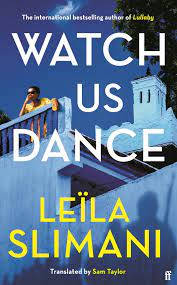In a captivating and insightful conversation, celebrated novelist Leila Slimani, interviewed by the esteemed Bonnie Greer, delved into the intricacies of her craft, the essence of her novels, and the influence of her Moroccan background on her writing. Slimani, known for her two critically acclaimed novels, opened up about her fascination with fiction and how her childhood experiences shaped her perception of reality.
The author discussed her latest novel “Watch Us Dance”, the second part of a trilogy of novels based on her family’s roots in revolutionary Morocco, with broadcaster Greer, who came of age in Chicago during the Civil Rights Movement.
Read: London Book Fair 2023: Colson Whitehead, class and community
“I’m obsessed with fiction, but it’s an obsession that comes from very far away,” Slimani shared at the British Library in London. As a child, she found it challenging to differentiate between fiction and reality, often immersing herself completely in the worlds of movies and books. This early inclination towards storytelling and blurring the lines between fact and fiction sowed the seeds for her future as a novelist.

Who is Leila Slimani?
Leila Slimani is a Franco-Moroccan writer and journalist. She is the personal representative of the French president Emmanuel Macron to the Organisation internationale de la Francophonie. In 2016 she was awarded the Prix Goncourt for her novel Chanson douce. Slimani was born in Rabat, Morocco, in 1981. She studied literature and political science in Paris, and then worked as a journalist for Jeune Afrique. Her first novel, Dans le Jardin de l'ogre, was published in 2014. Her breakthrough came with her novel "Chanson douce," known in English as "Lullaby" or "The Perfect Nanny." Published in 2016, the novel won the prestigious Prix Goncourt, one of France's most prestigious literary awards. "Lullaby" is a chilling psychological thriller inspired by a real-life tragedy and delves into the intricacies of the relationship between a nanny and the family she works for. Slimani's other novels include Adèle (2019 - English), Sexe et Mensonges (2017), In the Country of Others (2022 - English), and Watch Us Dance (2023 - English). She has also written two non-fiction books, Sexe et Mensonges: La Vie Sexuelle au Maroc (2016) and La baie de Dakhla : itinérance enchantée entre mer et désert (2018). Slimani is a vocal advocate for women's rights and has spoken out against violence against women. She is also a strong supporter of the French language and culture. In 2017, she was appointed by President Macron as his personal representative for the promotion of the French language and culture. She is a powerful voice for women's rights and a strong advocate for the French language and culture. Her work is sure to continue to be read and admired for many years to come.
Leila Slimani on the line between reality and fiction
Speaking to the American-British playwright, Slimani acknowledged that everyone constructs their versions of reality, including the people they meet. She believes that nothing is entirely real; everything is a form of fiction, including one’s perception of themselves. “When you tell a story about yourself to someone, or you tell them a memory, it’s a story you told yourself, but is it totally true?” she questioned. The multiplicity of perspectives and narratives intrigues her, driving her to explore the essence of human experience in her writing.
“As a child, I have to say that it was very difficult for me when I was a child to make a difference between fiction and reality. So you would say that I was a big liar, which is not completely untrue, but it was not just about lying. I was able, when I was watching a movie, I felt I was in the movie.”
LEila Slimani
Greer noted the physicality present in Slimani’s writing, describing it as “crunchy” and highlighting its unique portrayal of intimate moments. The interviewer wondered if this physicality stemmed from Slimani’s medical background within her family. Growing up in a household of doctors, Slimani had no qualms discussing the human body. Her mother, a doctor, exposed her to medical discussions and even showed her the inner workings of a sheep’s body during a religious ritual. This early exposure cultivated her comfort with the physical aspects of life and the human body.

Women’s bodies and fiction
Slimani’s upbringing in a patriarchal country like Morocco also played a significant role in shaping her writing. In a society where women’s bodies were often considered taboo and not discussed openly, Slimani felt the urge to challenge these norms through her fiction. Her novels explore intimate aspects of life, delving into the depths of human emotions and physical experiences. “I think it’s beautiful and very significant,” she expressed, unafraid to challenge societal conventions.
“I think, my obsession with the body, with the fact that I was raised in a very patriarchal country where women don’t own their own body.”
Leila Slimani
Her novels take readers on a journey through the inner thoughts and feelings of her characters. She believes that understanding a character’s body is crucial to defining their personality and soul. In contrast to some French novels that focus heavily on sociology and societal roles, Slimani prioritises defining characters based on their physicality, instincts, and emotions. She believes these raw and primal aspects of human existence hold great importance in shaping an individual.
Breaking cultural taboos and embracing the physicality of writing, Slimani’s novels offer readers an intimate exploration of human experiences, transcending the boundaries of society and culture. With her unique perspective on fiction and her bold approach to storytelling, Leila Slimani continues to captivate readers worldwide, reminding us of the beauty and complexity of our shared human nature. As she eloquently stated during the evening, “Everything is fiction, even ourselves.”
What is Watch Us Dance about?
Slimani weaves an atmospheric tale set in 1968 Morocco, on the brink of a transformative era. In her seductive and vibrant new novel, Slimani paints a vivid picture of a family and individuals entangled in the sweep of history. Mathilde, a woman filled with hope and pride, is based in Marrakech. Having achieved much in life, she embraces the limitless possibilities that lie ahead. After dedicating years to both war and the family farm, Mathilde believes it’s time to revel in the joys of life.
Unbeknownst to her, Morocco is on the verge of a new chapter in its history, and her family will be swept up in its tide of change. As her babies have grown into adults, they are about to discover that life can be unpredictable and take unexpected turns. Amidst the lush backdrop of a country on the brink of transformation, Slimani masterfully unravels the complexities of family, love, and the relentless march of time.